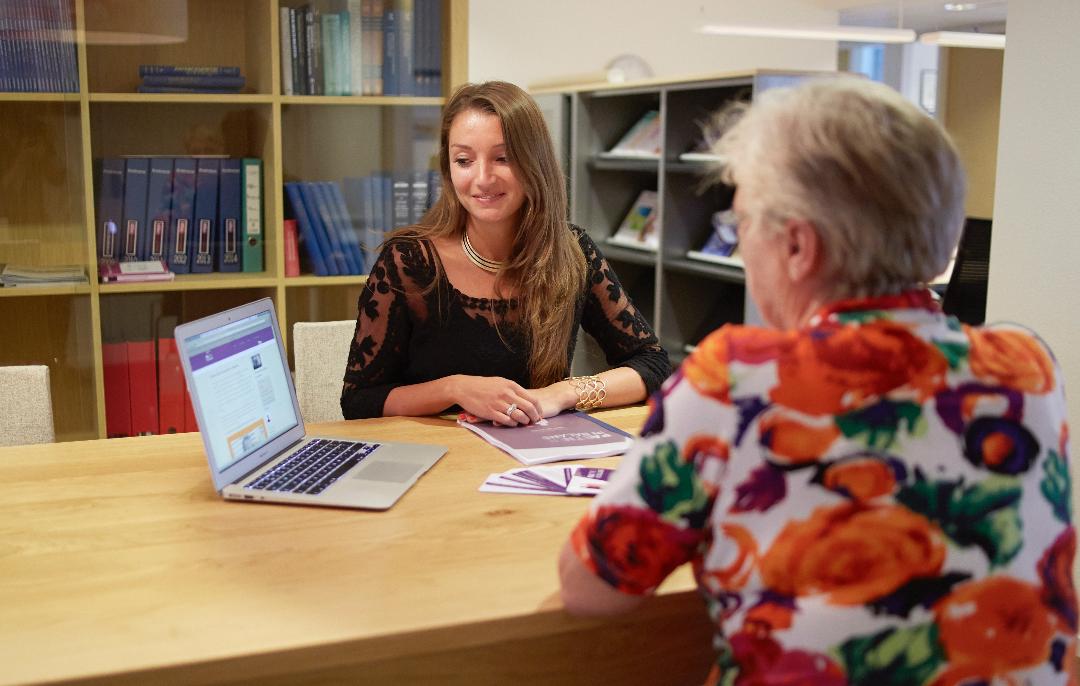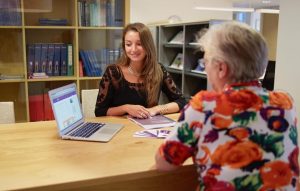Dutch Researchers Develop Apps to Help Caregivers of Dementia Patients

Lizzy Boots, center, coaches a dementia caregiver participating in Maastricht University Medical Center's Partner in Balance program.
Researchers at Maastricht University Medical Center in the Netherlands have developed two online apps to improve the lives of people who care for dementia patients, and will soon create one for patients themselves.
One app provides caregivers with information they can use to achieve balance in their lives. Those participating in the Partner in Balance program — a study to create a care self-management program for caregivers of those with dementia — must complete four of 12 modules on topics such as “The Changing Family Member,” “Social Relations and Support,” and “Focusing on the Positive.”
The other is a feelings-reporting smartphone app. Caregivers use it 10 times a day, three times a week, for eight weeks to let healthcare professionals know how their day is going.
“The goal is for caregivers to understand which activities increase their stress and depression and which offer them relief, satisfaction or happiness,” said Marjolein de Vugt, PhD, whose team developed both programs. Such insight is the first step toward caregivers coming up with their own coping and joy-activating strategies, she said.
The ultimate objective for researchers of Alzheimer’s and other dementias is to find ways to stop the disease from progressing, de Vugt said. Until then, healthcare professionals will focus on helping dementia patients lead fulfilling lives.
“Providing support to caregivers is critical to this,” de Vugt told Alzheimer’s News Today in a phone interview.
The Partner in Balance program can benefit all caregivers, she said. But it was designed for those helping patients whose dementia shows up earlier than normal — that is, before age 65.
Such caregivers are especially susceptible to burnout between the initial shock of learning about their loved one’s condition and their adjustment to the new reality, said de Vugt, Maastricht Medical University’s professor of psychosocial innovations in dementia.
The professor spoke about e-health caregiver apps at the Alzheimer Europe convention, which took place in The Hague in October.
She began to focus on dementia in 1999, while pursuing a psychology degree at the university. Her internship at the university’s Memory Center showed her firsthand “the struggles of people dealing with dementia in their daily lives,” she said. “I decided I wanted to make a difference for them.”
She finished her PhD in 2004, and returned to the Memory Center two years later.
Coaches for caregivers
Healthcare professionals acting as coaches work with every caregiver in the Partner in Balance program. Every coach meets with the same caregiver twice — initially to help decide what he or she hopes to achieve with the program, and once finished, whether those goals were met. Coaches also offer weekly email feedback on the caregivers’ progress.
Caregivers can choose from nine other modules: “Self-understanding,” “Acceptance,” “Balance in Activities,” “Communication with Family Member and Environment,” “Insecurities and Rumination,” “Coping with Stress,” “Impact on the Family,” “Worries about Heredity,” and “Combining Care and Work.”
Besides reading about a topic and learning practical tips for dealing with it, caregivers do assignments on how to use that information in their personal lives. The modules include videos of other caregivers talking about a topic.
Caregivers report that the Partner in Balance program has given them greater control over their lives and “even increased the quality of their lives,” de Vugt said.
Developing coping strategies
In the feelings-reporting project, caregivers respond to randomized beeps from a smartphone app 10 times a day by filling out short online questionnaires on how things are going.
De Vugt said her team decided that randomized reporting times were the best way to capture caregivers’ daily ups and downs. Otherwise, there might be bias in the results — for example, caregivers filling out questionnaires only when things are going well or going badly.
Every two weeks, her team gives caregivers feedback on the data being generated — and a key finding so far is a correlation between the way caregivers cope with difficult situations and the level of stress they experience, she said.
Another is a link between some caregiver activities and a sense of well-being.
“For example, a common pattern is that active relaxation generates positive emotions,” de Vugt said. This finding can prompt caregivers to carve out time during their day for active relaxation, she said.
The researchers made a conscious decision not to have coaches give caregivers coping advice. Instead, helpers are made aware of activities that generate negative and positive emotions so that they can develop their own coping mechanisms.
Caregivers who use three coping strategies in particular are less likely to become emotionally drained, de Vugt said. One is “seeking distraction” — shifting to activities that take caregivers’ minds off stressful situations for a while. Another is “seeking social support” — reaching out to family and friends for encouragement. The third is “fostering reassuring thoughts” — caregivers thinking positive about what they are experiencing.
De Vugt said her team has been considering how to implement the feelings-reporting program on a wider scale so that more caregivers can benefit from it. The researchers also want to develop a way to give caregivers feedback in real time — daily rather than every two weeks. The idea is that daily feedback would prevent stress from accumulating by allowing caregivers to make quicker adjustments.
The results of the feelings-reporting program have been promising enough that de Vugt said her team will be testing it on 30 patients for a pilot project. She said the biggest challenge has been finding patients who are adept with a mobile phone and “are able to respond to the questionnaires 10 times a day, three days a week.”








